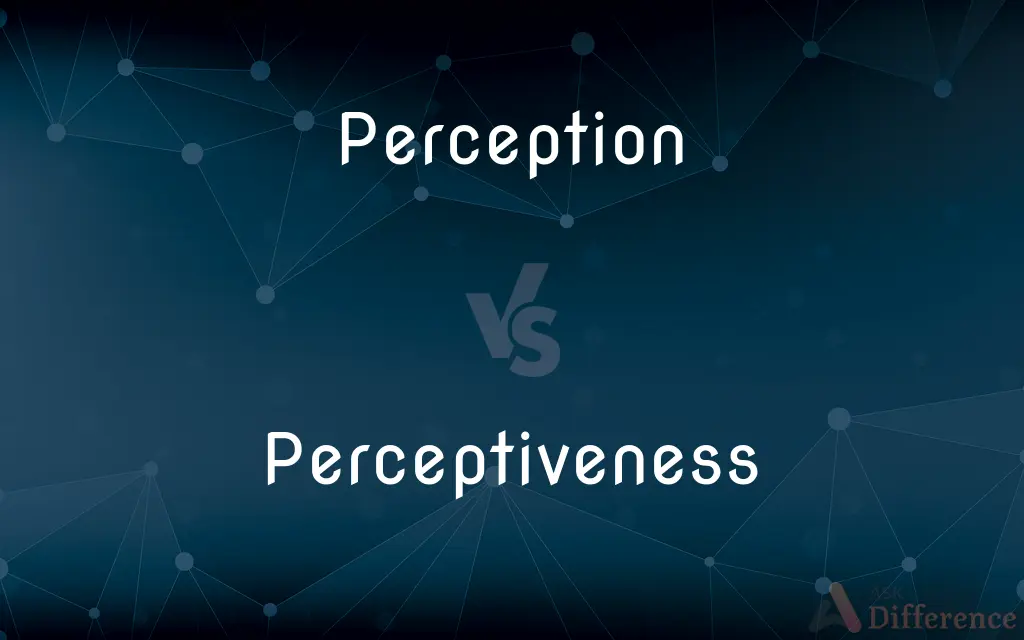Perception vs. Perceptiveness — What's the Difference?
By Tayyaba Rehman & Urooj Arif — Updated on March 31, 2024
Perception is the process of recognizing and interpreting sensory information, while perceptiveness is the ability to notice or understand things quickly and easily.

Difference Between Perception and Perceptiveness
Table of Contents
ADVERTISEMENT
Key Differences
Perception involves the sensory process of gathering information from the environment and interpreting it, forming our understanding of the world around us. It is a fundamental cognitive ability that enables us to navigate and interact with our surroundings, relying on our senses like sight, hearing, touch, taste, and smell. Perceptiveness, on the other hand, refers to an individual's keenness or acuity in understanding or grasping information, ideas, or situations. It denotes a level of insight and awareness that allows someone to notice subtle cues or nuances that others might overlook.
While perception is a broader term that encompasses the physiological and cognitive processes involved in sensory information processing, perceptiveness is more about the quality or skill of being good at perceiving. For example, someone might have a normal range of perception in terms of their sensory abilities but can be particularly perceptive when it comes to reading people's emotions or understanding complex concepts quickly.
Perception can vary widely among individuals based on factors like biological differences, past experiences, and current context, affecting how we interpret stimuli. Perceptiveness, however, is often considered a trait or skill that can be developed, reflecting an individual's capacity for deep understanding or empathy. It is frequently lauded as a valuable characteristic in fields requiring analytical skills, creativity, or emotional intelligence.
The distinction between perception and perceptiveness is also apparent in how we talk about various domains such as art, literature, and interpersonal communication. While we might discuss the perception of color or sound in a technical or physiological sense, we refer to perceptiveness in appraising someone's ability to discern themes, intentions, or emotions with a depth of understanding.
Both perception and perceptiveness are crucial for human cognition and social interaction. Perception provides the raw sensory input that our brains interpret, while perceptiveness enhances our ability to make nuanced judgments and understandings based on that input, contributing to our overall intelligence and social adeptness.
ADVERTISEMENT
Comparison Chart
Definition
The process of recognizing and interpreting sensory information.
The ability to notice or understand things quickly and easily.
Nature
A cognitive and sensory process.
A skill or trait related to insight and awareness.
Focus
On the physiological and cognitive processing of sensory information.
On the acuity and keenness in understanding or grasping information.
Variability
Varies with biological differences, experiences, and context.
Considered a developable trait or skill.
Application
Fundamental in navigating and interacting with the environment.
Valued in analytical, creative, or emotionally intelligent contexts.
Compare with Definitions
Perception
Essential for understanding and navigating the world.
Perception of depth is crucial for moving through space safely.
Perceptiveness
The quality of being quick and accurate in understanding.
Her perceptiveness about people's moods made her an excellent counselor.
Perception
The same stimuli can be perceived differently depending on the situation.
A sound might be perceived as louder in a quiet room than in a noisy one.
Perceptiveness
Involves noticing subtle details or changes.
His perceptiveness in negotiations often led to successful outcomes.
Perception
The cognitive process of interpreting the environment through senses.
His perception of the melody changed after he learned to play the piano.
Perceptiveness
Can be improved with practice and experience.
Reading literature can enhance one's perceptiveness about human nature.
Perception
Relies on sensory organs to gather information.
The perception of color is influenced by light and visual acuity.
Perceptiveness
Involves deep understanding or intuition.
Perceptiveness allows artists to convey complex emotions through their work.
Perception
Influenced by experiences and physiological factors.
Two people might have different perceptions of the same event.
Perceptiveness
Especially important in roles requiring empathy or analytical skills.
A perceptive teacher can better understand students' needs.
Perception
Perception (from the Latin perceptio, meaning gathering or receiving) is the organization, identification, and interpretation of sensory information in order to represent and understand the presented information or environment.All perception involves signals that go through the nervous system, which in turn result from physical or chemical stimulation of the sensory system. For example, vision involves light striking the retina of the eye; smell is mediated by odor molecules; and hearing involves pressure waves.
Perceptiveness
Of or relating to perception
Perceptive faculties.
Perception
The process of perceiving something with the senses
The perception of a faint sound.
Perceptiveness
Having the ability to perceive; keen in discernment.
Perception
An instance of this
Sense perceptions.
Perceptiveness
Marked by discernment and understanding; sensitive.
Perception
The process or state of being aware of something
The perception of time.
Perceptiveness
The state of being perceptive; acumen, discernment, insight
Perception
Insight or knowledge gained by thinking
The perception that inheritance must be coded in DNA.
Perceptiveness
A feeling of understanding
Perception
The capacity for such insight or knowledge
Theories of how to enhance human perception.
Perceptiveness
Delicate discrimination (especially of aesthetic values);
Arrogance and lack of taste contributed to his rapid success
To ask at that particular time was the ultimate in bad taste
Perception
An insight or point of knowledge
The article is full of astute perceptions.
Perceptiveness
Perception of that which is obscure
Perception
An interpretation or impression; an opinion or belief
Doctors working to change the public perception of certain diseases.
Perceptiveness
The quality of insight and sympathetic understanding
Perception
The organisation, identification and interpretation of sensory information.
Perception
Conscious understanding of something.
Have perception of time
Perception
Vision (ability)
Perception
Acuity
Perception
(cognition) That which is detected by the five senses; not necessarily understood (imagine looking through fog, trying to understand if you see a small dog or a cat); also that which is detected within consciousness as a thought, intuition, deduction, etc.
Perception
The act of perceiving; cognizance by the senses or intellect; apperhension by the bodily organs, or by the mind, of what is presented to them; discernment; apperhension; cognition.
Perception
The faculty of perceiving; the faculty, or peculiar part, of man's constitution by which he has knowledge through the medium or instrumentality of the bodily organs; the act of apperhending material objects or qualities through the senses; - distinguished from conception.
Matter hath no life nor perception, and is not conscious of its own existence.
Perception
The quality, state, or capability, of being affected by something external; sensation; sensibility.
This experiment discovereth perception in plants.
Perception
An idea; a notion.
Perception
The representation of what is perceived; basic component in the formation of a concept
Perception
A way of conceiving something;
Luther had a new perception of the Bible
Perception
The process of perceiving
Perception
Knowledge gained by perceiving;
A man admired for the depth of his perception
Perception
Becoming aware of something via the senses
Common Curiosities
What is perception?
Perception is the process by which individuals interpret sensory information from their environment, essential for understanding and interacting with the world.
How do perception and perceptiveness differ in their application?
Perception is fundamental to all sensory experiences, while perceptiveness is particularly valued in contexts requiring deep understanding or quick insight, such as emotional intelligence or analytical tasks.
How does perceptiveness contribute to effective communication?
Perceptiveness enables individuals to read between the lines, understand non-verbal cues, and grasp the underlying emotions or intentions in communication, leading to more effective and empathetic interactions.
Can perceptiveness be developed?
Yes, perceptiveness can be improved through practice, experiences, and by enhancing one's empathy and awareness of the surrounding world.
What does perceptiveness mean?
Perceptiveness is an individual's ability to quickly and accurately notice or understand subtle details, changes, or complex concepts.
Is perception purely physiological?
While perception involves physiological processes to receive sensory information, interpreting this information also requires cognitive processing, making it both a physiological and cognitive function.
Are there tools or methods to improve perceptiveness?
Engaging in activities that challenge one's observation skills, empathy, and critical thinking, such as reading, art, and mindfulness practices, can enhance perceptiveness.
Can someone have good perception but low perceptiveness?
Yes, it's possible to have normal sensory perception but lower perceptiveness in terms of quickly understanding or noticing the finer details or implications of a situation.
How does one's environment affect perception and perceptiveness?
The environment can significantly influence both perception (by providing different sensory stimuli) and perceptiveness (through experiences that can enhance one's insight and awareness).
How do cultural factors influence perception and perceptiveness?
Cultural background can shape how individuals perceive sensory information and what they are perceptive to, based on cultural norms, values, and learned behaviors.
Share Your Discovery

Previous Comparison
Pickle vs. Predicament
Next Comparison
Miss vs. MissyAuthor Spotlight
Written by
Tayyaba RehmanTayyaba Rehman is a distinguished writer, currently serving as a primary contributor to askdifference.com. As a researcher in semantics and etymology, Tayyaba's passion for the complexity of languages and their distinctions has found a perfect home on the platform. Tayyaba delves into the intricacies of language, distinguishing between commonly confused words and phrases, thereby providing clarity for readers worldwide.
Co-written by
Urooj ArifUrooj is a skilled content writer at Ask Difference, known for her exceptional ability to simplify complex topics into engaging and informative content. With a passion for research and a flair for clear, concise writing, she consistently delivers articles that resonate with our diverse audience.















































